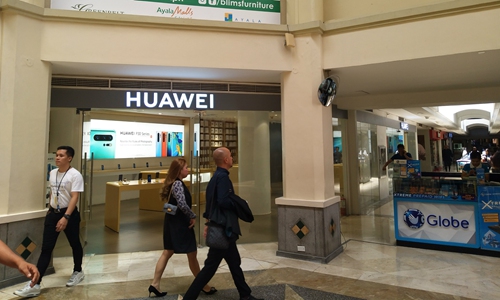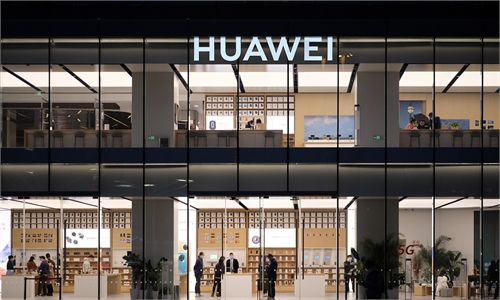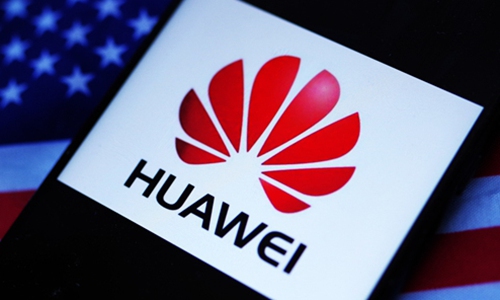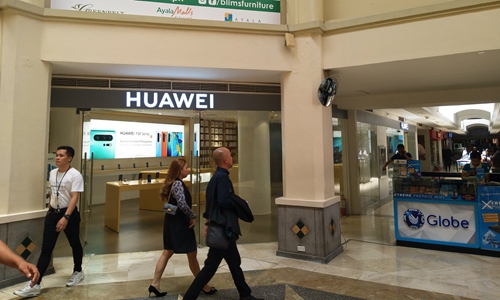Huawei’s chipset deal with Samsung uncertain
Firm to survive even if manufacturing contractor not secured: analysts

A Huawei store stands next to a Globe Telecom booth in Makati City, the Philippines on April 14, 2019. Photo: cnsphoto
Chinese tech giant Huawei Technologies will find a way out securing an outside supplier for its foundry before the US ban takes effect and the possibility of self-manufacturing could not be excluded, analysts said, although the firm has met some obstacles as media reports claim.
The comment followed that Samsung, South Korea's largest company that has both the capability of chipset design and customized chip foundry manufacturing, has turned down Huawei's request to supply smartphone chips, according to the Korea JoongAng Daily.
Huawei has been actively seeking new outside suppliers to deliver chipsets after the US announced on May 15 a new rule to require US government licenses for chip sales to Huawei that are made abroad with US technologies.
The US Commerce Department is expected to announce details of the new rule in mid-July. The relentless ban by the US has weighed on contractors like Taiwan Semiconductor Manufacturing Co (TSMC), the world's largest contract chipmaker and a key supplier for Huawei.
Huawei has asked Samsung to provide it with self-developed integrated chips that combine smartphone program processing chip with 5G communication module, media reported.
Separately, Taiwan-based Digitimes also reported that Samsung is unlikely to be a foundry partner of Huawei to support Huawei's "de-Americanization" in the wake of the US sanctions, citing industry observers.
Samsung has not responded to an interview request from the Global Times as of press time on Sunday.
There's still "a motive" that Huawei and Samsung may cooperate, Ma Jihua, a veteran industry analyst and a close follower of Huawei, told the Global Times Sunday.
"Despite the two may have to compete in some aspects, an industry giant like Samsung does not want to see Huawei, a respectful competitor to die under coercion, also vice versa," said Ma.
Moreover, if Samsung could help Huawei get through the difficult time "in some way," the South Korean firm can greatly improve its prestige in the vast Chinese market, experts noted.
Media reports emerged last week saying that Samsung and Huawei are considering a deal in which Samsung could help make semiconductor chips for Huawei's global-advanced 5G networks. Chinese analysts said there is a 50-50 chance a deal could be reached.
Samsung Electronics has begun building a cutting-edge 5nm chip production line dedicated to its made-to-order chip foundry business, an arena TSMC dominates, which will help it compete with TSMC in the business of making chipsets for external clients, according to a Bloomberg report in May.
Huawei has been stepping up its strategy of chipsets supply during the 120-day grace period.
Xiang Ligang, a veteran Chinese telecoms observer, told the Global Times Sunday that the chip stockpiles of Huawei could last to the end of 2021. And the TSMC may be accelerating chip sales to Huawei to provide up to a year's chips supply before the US' ban take effect.
Domestic chipmaker Semiconductor Manufacturing International Corp (SMIC) could also supply Huawei when the latter's stockpile run out, Xiang said. SMIC's next-generation foundry node known as N+1, which boasts a conspicuous improvement in performance and logic density, has made steady progress in research and development (R&D).
"There could be many changes ahead including from the US, and Huawei may not necessarily come to a corner, as the industry is highly concerned," said Xiang.
Even if Huawei cannot secure outside chip suppliers like TSMC or Samsung, it has the capabilities to realize chip manufacturing itself, he added.
"Based on my historical observation, Huawei has the ability to surprise the industry thanks to its powerful R&D," Xiang noted.
Since the latest US chip ban was announced, Ma said there are noises or rumors in the market, just like a year ago when Huawei was put on the US Entity List. "But Huawei survives and lives quite well over the past year."
Huawei overtook Samsung, becoming the world's largest smartphone maker for the first time in April this year with a 19 percent market share, according to market research consultancy Counterpoint Research.
Samsung, which had been the top cellphone vendor for many years, saw its share dip to 17 percent during the period due to coronavirus lockdowns in its key markets such as India, Latin America, Europe, and the US.



